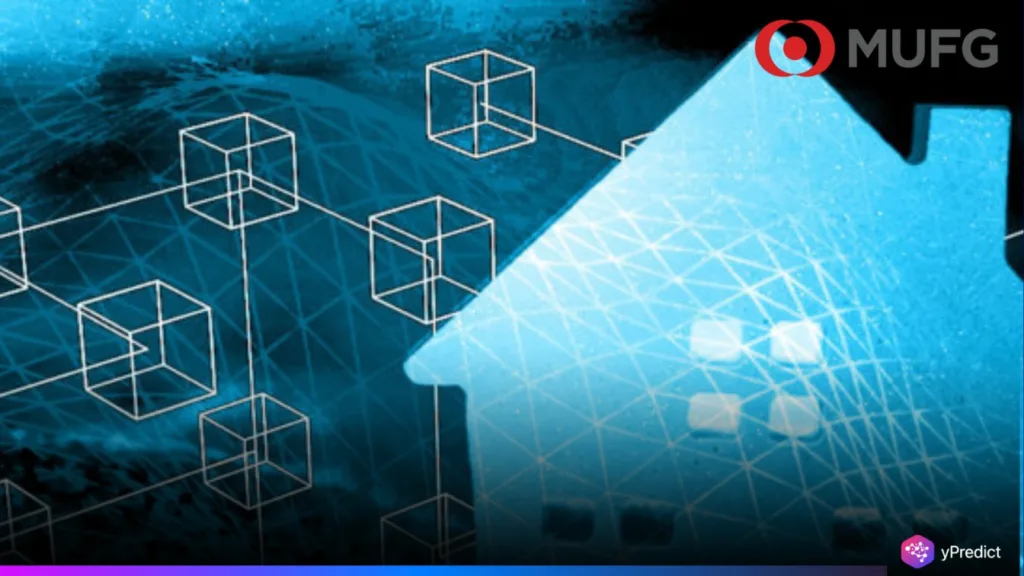
Mitsubishi UFJ Financial Group has launched into real estate tokenization using blockchain technology. The bank’s entry into the space is an ambitious plan that uses AI to transition traditional finance to a crypto world where banks have resisted innovation for too long. Blockchain technology could account for $1.76 trillion in economic activity in the global economy by 2030. The bank’s initiative demonstrates that it will engage in digital transformation. AI – automation, compliance, and targeting investors – is the mechanism to ultimately transfer the entire economy to this arena.
AI Drives Real Estate Tokenization Strategy
Mitsubishi UFJ is utilizing artificial intelligence (AI) in its real estate tokenization program. The process utilizes blockchain technology to replace the manual documentation of a real estate transaction with an AI-automated smart contract, which should allow faster and safer transactions to happen in a more automated process. Various AI tools can scan property records, evaluate values of assets, and assess investor credentials in real-time accuracy, allowing the bank’s processes to be in an almost fully automated state. Through the use of AI, the legal checks being performed by the bank have become more streamlined, while reducing the likelihood of false and/or fraudulent transactions, providing greater investor confidence when dealing with blockchain-backed assets.
By tokenizing real estate, Mitsubishi UFJ is creating digital units of value (tokens) that investors can trade on all platforms that are linked to crypto markets. Their AI systems could evaluate the liquidity of the tokens created, assess the buyer profiles, and monitor buyer trends that determine demand. This could allow the bank to customize its investment product options to clients based on the results of predictive analytics that might be afforded by their AI systems.
Crypto Markets Attract Institutional Confidence
Mitsubishi UFJ’s blockchain initiative directly targets the fast-growing crypto markets. While many financial institutions remain cautious, Mitsubishi is integrating AI to navigate the space confidently. Advanced AI models detect volatile shifts in the crypto landscape and adjust asset exposure accordingly. This helps the bank mitigate risk while entering a market often considered unpredictable. Japan’s expected interest rate freeze adds pressure on banks to find new sources of yield. AI algorithms simulate economic scenarios and guide the bank’s entry into digital assets with data-backed precision.
This shift challenges the idea that large institutions avoid crypto. Mitsubishi UFJ’s actions show that with the right AI systems in place, traditional banks can adopt blockchain technology and tap into crypto markets responsibly. The bank’s AI also enhances investor outreach. The technology adapts based on investor profiles and behaviors, creating tailored products for each segment. Mitsubishi’s AI approach means even retail clients could engage in what was once a deep-pocket capital market, extend the Android bank’s reach more broadly, and increase participation through digital channels.
Blockchain Adoption Secured by AI-Driven Compliance
Regulatory approval has long been a roadblock in blockchain adoption. Mitsubishi UFJ overcomes this by using AI to manage compliance. These systems provide automated detection of regulatory changes, an automated flagging of non-compliant actions. Audits allowing the bank to develop blockchain-based products on the basis of Japan’s increasingly complex regulatory environment.
This level of AI backed transparency not only satisfies far more red-tape regulatory efforts, but also meets the requirements of institutional investors who require rigorous oversight when deploying new products and services, often using their clients’ funds. In a space where compliance errors can trigger regulatory penalties, Mitsubishi’s AI-enhanced blockchain systems stand out. The bank’s ability to deploy this tech responsibly gives it a first-mover advantage in Japan’s financial landscape.
AI Connects Legacy Finance to Digital Assets
Mitsubishi UFJ isn’t just applying blockchain to real estate—it is integrating AI across its infrastructure to modernize operations. Legacy systems often resist change, but AI bridges the gap. It interprets outdated data, communicates across silos, and automates investment workflows. This end-to-end automation accelerates tokenization, cuts costs, and enables real-time reporting. From onboarding investors to managing asset distribution, AI ensures accuracy and speed. Mitsubishi’s AI tools create instant valuations, predict demand, and optimize token supply across multiple blockchain platforms.
These features allow the bank to respond quickly to market shifts and position itself competitively in the AI-led crypto space. Unlike passive experiments, this is a full-scale AI deployment across blockchain technology. Mitsubishi UFJ’s real estate tokenization initiative marks a turning point in traditional banking. The bank has entered the crypto markets using an AI+ blockchain technology. This prompt, AI-led shift highlights a changed role for institutions in digital finance and represents a broader change taking place across the banking industry.






